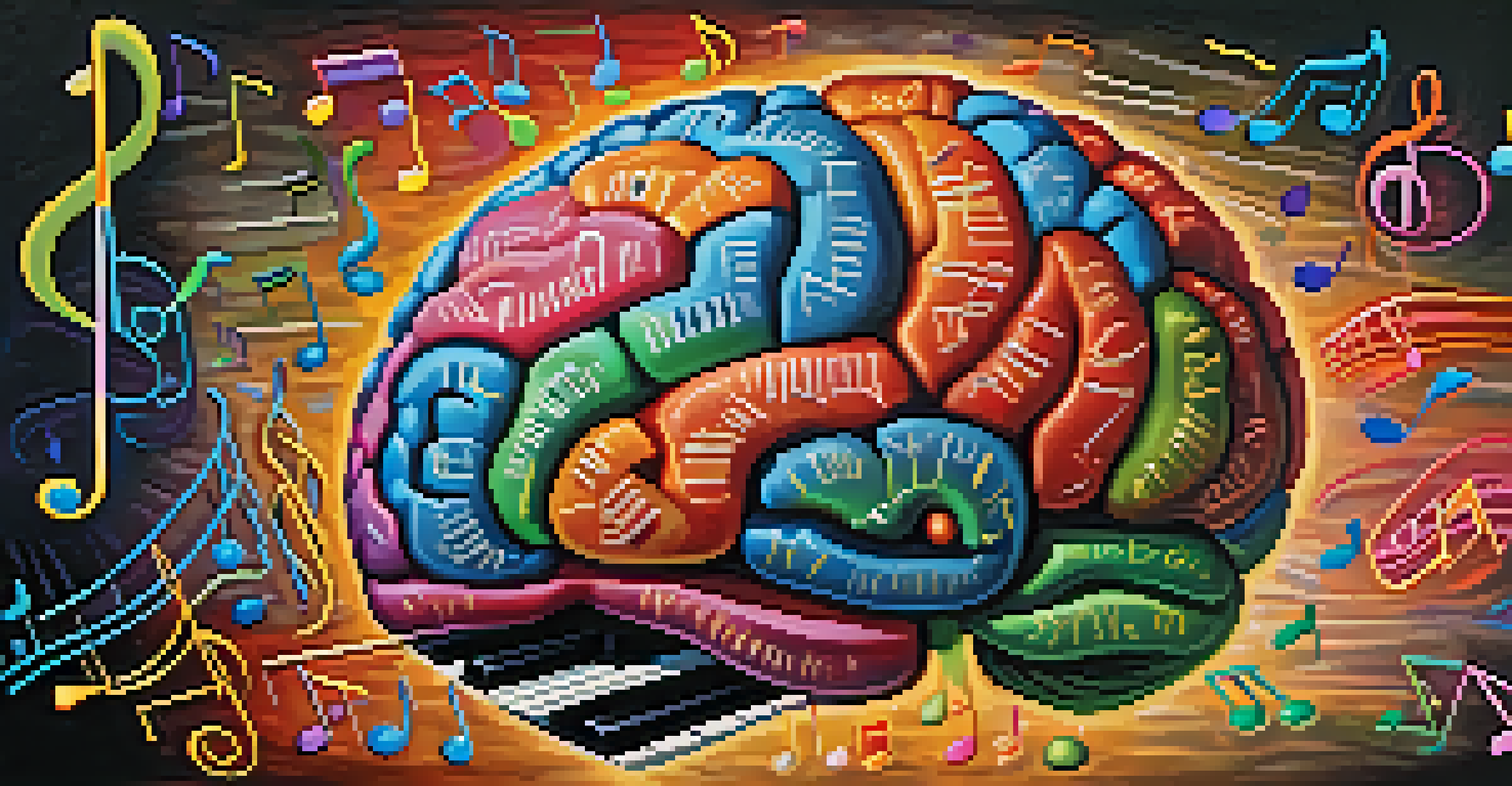Music as a Memory Trigger: Techniques for Enhanced Recall

Understanding the Link Between Music and Memory
Music has a unique ability to evoke memories, often transporting us back to specific moments in our lives. This phenomenon occurs because music engages various parts of the brain, particularly those associated with emotion and memory. For instance, a song from your high school days might trigger vivid recollections of friendships and events, making the past feel almost tangible.
Music can change the world because it can change people.
Research shows that our brains are wired to connect music with emotional experiences, which is why a particular tune can instantly remind us of a loved one or a significant event. This emotional connection creates a strong neural pathway, making it easier for us to recall related memories when we hear the song again. In this way, music serves as a powerful cue for memory retrieval.
Furthermore, the rhythm and melody of music can help structure our thoughts, making it easier to organize information in our minds. This is why many students use music while studying; it not only helps them concentrate but also enhances their ability to remember what they’ve learned.
Using Music to Trigger Specific Memories
To enhance memory recall, you can deliberately associate specific songs with particular memories or tasks. For example, if you want to remember a significant life event, listen to a song that was playing during that time. The next time you hear that song, it can prompt a flood of memories related to that event, making it easier to recall details you might have otherwise forgotten.

Creating a personalized playlist can be a fun way to harness this technique. Curate a collection of songs that correspond to different times in your life or significant experiences. When you listen to this playlist, you’ll not only enjoy the music but also stimulate memories linked to each track, enhancing your overall recall.
Music Triggers Strong Memories
Listening to music can evoke vivid memories by activating emotional connections in the brain.
This method can also work for studying. If you frequently listen to a specific genre of music while learning a subject, that music can trigger your memory during exams or when discussing the topic. This technique leverages the brain’s natural ability to form associations, making your recall much more effective.
The Science Behind Music and Memory Recall
Numerous studies have explored the relationship between music and memory, revealing fascinating insights into how our brains function. For instance, research indicates that listening to music activates the hippocampus, a region of the brain crucial for forming and retrieving memories. This activation can lead to improved recall, particularly when the music is familiar or emotionally charged.
Where words fail, music speaks.
Moreover, the type of music can influence the effectiveness of memory recall. Upbeat, energetic music may boost mood and motivation, while calmer tunes might enhance focus and concentration. Understanding these nuances can help you choose the right music to optimize your memory recall for various situations.
Incorporating music into our daily routines can lead to positive cognitive benefits. Whether it's background music while working or specific playlists for studying, these auditory cues can help create a conducive environment for memory retention and recall.
Techniques for Enhancing Memory Through Music
There are several techniques you can employ to use music as a memory trigger effectively. One popular method is the 'method of loci,' where you visualize a familiar place and associate specific songs or memories with different locations within that space. This vivid imagery can aid in memory recall, making it easier to retrieve information later.
Another technique involves creating thematic playlists. For example, you could compile songs that represent different emotions or life stages. By regularly listening to these playlists, you reinforce the connections between the music and the memories, helping to solidify them in your mind.
Music Boosts Memory Recall
Listening to music can activate brain regions associated with memory, making it easier to retrieve specific recollections.
Additionally, you might consider using music in tandem with mnemonic devices. For instance, turning information into a catchy jingle can make it more memorable. The rhythm and melody can serve as cues, making it easier to remember the associated information.
The Role of Nostalgia in Memory Recall
Nostalgia plays a significant role in how music influences memory recall. When we listen to music from our past, it often evokes feelings of nostalgia, making us reminisce about moments that shaped us. This emotional engagement can amplify our memories, making them more vivid and easier to access.
For many, certain songs can bring back a rush of emotions tied to specific experiences, like a first love or a family gathering. This connection can create a rich tapestry of memories that are easily retrievable when we hear the song again. Embracing nostalgia can be a powerful tool for enhancing our memory recall.
Interestingly, the positive emotions associated with nostalgic memories can also uplift our mood. This emotional benefit can further enhance cognitive function, creating a cycle where good feelings boost memory recall, and strong memories foster more good feelings.
Practical Tips for Using Music as a Memory Tool
To effectively use music as a memory tool, start by identifying songs that resonate with you personally. Consider creating playlists for different aspects of your life, such as a study playlist, a workout mix, or a nostalgic playlist. By curating these collections, you can easily access music that triggers specific memories or enhances focus when you need it.
Additionally, try to listen to music in the same context where you want to recall information. For example, if you study with a particular playlist, make sure to listen to it during exams or when discussing the material. This approach will strengthen the connection between the music and the memories, leading to better recall.
Nostalgia Enhances Memory
Music from our past often evokes nostalgia, which amplifies emotional connections and makes memories more vivid.
Finally, be mindful of the volume and type of music you choose. Instrumental tracks are often less distracting and can create a conducive environment for studying or working. Experiment with different genres to find what works best for you, and remember to enjoy the process of discovery as you enhance your memory through music.
Conclusion: Embracing Music for Memory Enhancement
In conclusion, music is a powerful ally in enhancing memory recall. By understanding the connection between music and memory, you can use this knowledge to create meaningful experiences that help you remember. Whether it’s through nostalgia, personalized playlists, or specific techniques, music can enrich our lives and aid in cognitive function.
As you explore the potential of music in your own life, consider how it can serve as a tool for enhancing not just memory, but also emotional well-being. By incorporating music into your daily routines, you can create a positive feedback loop that fosters both recall and happiness.

So, the next time you hear a familiar tune, take a moment to reflect on the memories it brings. Embrace the magic of music, and let it guide you in unlocking the treasure trove of memories that shape who you are.